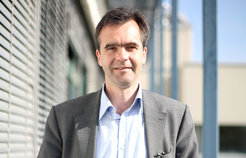Leopoldina honors human geneticist Stefan Mundlos
Researcher receives Mendel Medal for findings on gene regulation and genetic skeletal malformations
The German National Academy of Sciences Leopoldina honors its member Stefan Mundlos with the Mendel Medal. With this award, the Academy recognizes the researcher's outstanding scientific work in the field of human genetics, in particular his findings on genetic causes of skeletal malformations and the regulation of gene activity. Mundlos conducts research at the Max Planck Institute for Molecular Genetics and at the Charité - Universitätsmedizin Berlin. The Mendel Medal will be presented during the ceremonial opening of the Leopoldina Annual Assembly - subject to the then current pandemic situation - on Friday, September 24, 2021, in Halle (Saale).

Stefan Mundlos researches inherited skeletal malformations and rare bone diseases. His work is concerned with the question of how the regulation of gene activity influences human development and why diseases and malformations occur.
Variations in the Three-Dimensional Structure of the Genome
In his research, Mundlos studies non-coding sections of the human genome. These make up about 98 percent of the genome. Although they do not contain building instructions for proteins, they still fulfill important regulatory functions. For example, they influence gene expression, i.e. whether and when a gene is transcribed and how much protein is produced as a result. Mundlos showed for the first time that changes in non-coding regions can also lead to disease. The human genetic material, DNA, is predominantly found densely packed in the cell nucleus in the form of chromatin.
In his work, the human geneticist discovered that deviations in the genome structure alter the three-dimensional folding of chromatin in the cell nucleus. This results in defective gene regulation and various kinds of malformations. His studies are also devoted to the molecular causes of short-fingeredness (brachydactyly). He found that defects in the BMP (Bone Morphogenetic Protein) signaling pathway severely disrupt the formation of cartilage structure. In his work, Mundlos combines basic and clinical research. He uses innovative techniques to analyze not only the sequence but also the three-dimensional structure of the genome and to understand genetic causes of malformations using genome editing methods such as CRISPR/Cas9.
About Stefan Mundlos
Stefan Mundlos studied medicine at the University of Göttingen, the University of California in San Diego/USA, the University of Marburg, the University of Melbourne/Australia and the University of Heidelberg. In 1986, he received his doctorate and subsequently completed his residency in pediatrics and human genetics at the Children's Hospital of the University of Mainz. From 1993 to 1994, he conducted research at the Royal Children's Hospital and Murdoch Institute for Research into Birth Defects at the University of Melbourne/Australia. This was followed by a research stay at Harvard Medical School in Boston/USA, before he habilitated at the University of Mainz in 1997. From 1998 to 2000 he held a professorship in developmental genetics at the Institute of Human Genetics in Heidelberg. In 2000, he was appointed to the chair of Medical Genetics at the Charité - Universitätsmedizin in Berlin and took up a research group at the Max Planck Institute for Molecular Genetics. Since 2009, he has been director of the Institute of Medical Genetics and Human Genetics at Charité - Universitätsmedizin Berlin.
The Mendel Medal of the National Academy of Sciences Leopoldina
The Mendel Medal was established in 1965 in honor of Gregor Mendel (1822-1884), the founder of the theory of heredity. With this award, the Leopoldina recognizes pioneering achievements in the field of general and molecular biology or genetics. Previous recipients include biophysicist and Nobel laureate Max Delbrück (1967) and biologist Sydney Brenner (1970), who received the Nobel Prize in Medicine in 2002.
As the German National Academy of Sciences, the Leopoldina provides independent science-based policy advice on socially relevant issues. To this end, the Academy prepares interdisciplinary statements based on scientific findings. These publications identify options for action; it is up to democratically legitimized politicians to decide. The experts who write statements work on an honorary basis and with a neutral approach. The Leopoldina represents German science in international bodies, including science-based advice for the annual G7 and G20 summits. It has 1,600 members from more than 30 countries and brings together expertise from almost all fields of research. It was founded in 1652 and was named Germany's National Academy of Sciences in 2008. As an independent science academy, the Leopoldina is committed to the common good.












